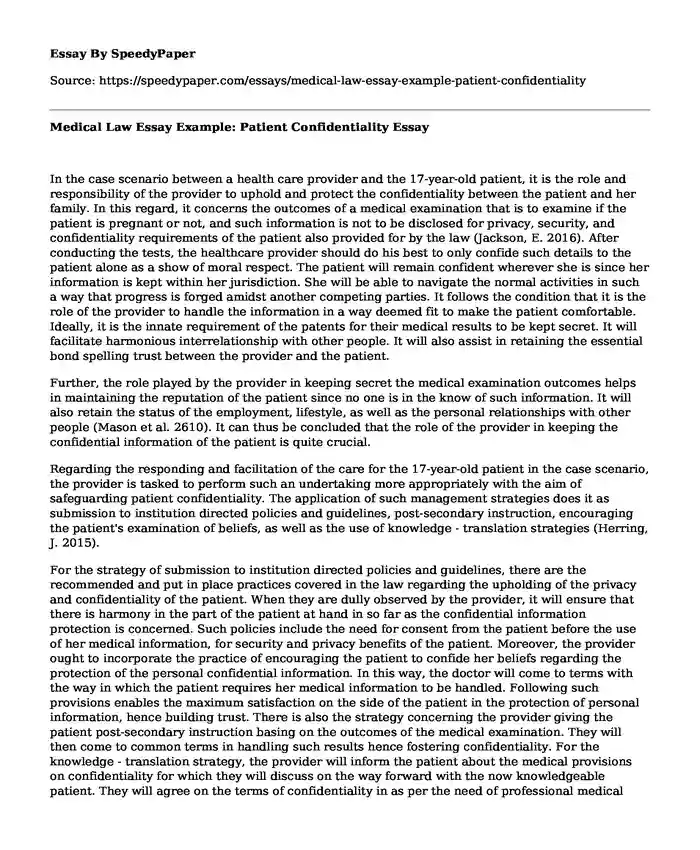In the case scenario between a health care provider and the 17-year-old patient, it is the role and responsibility of the provider to uphold and protect the confidentiality between the patient and her family. In this regard, it concerns the outcomes of a medical examination that is to examine if the patient is pregnant or not, and such information is not to be disclosed for privacy, security, and confidentiality requirements of the patient also provided for by the law (Jackson, E. 2016). After conducting the tests, the healthcare provider should do his best to only confide such details to the patient alone as a show of moral respect. The patient will remain confident wherever she is since her information is kept within her jurisdiction. She will be able to navigate the normal activities in such a way that progress is forged amidst another competing parties. It follows the condition that it is the role of the provider to handle the information in a way deemed fit to make the patient comfortable. Ideally, it is the innate requirement of the patents for their medical results to be kept secret. It will facilitate harmonious interrelationship with other people. It will also assist in retaining the essential bond spelling trust between the provider and the patient.
Further, the role played by the provider in keeping secret the medical examination outcomes helps in maintaining the reputation of the patient since no one is in the know of such information. It will also retain the status of the employment, lifestyle, as well as the personal relationships with other people (Mason et al. 2610). It can thus be concluded that the role of the provider in keeping the confidential information of the patient is quite crucial.
Regarding the responding and facilitation of the care for the 17-year-old patient in the case scenario, the provider is tasked to perform such an undertaking more appropriately with the aim of safeguarding patient confidentiality. The application of such management strategies does it as submission to institution directed policies and guidelines, post-secondary instruction, encouraging the patient's examination of beliefs, as well as the use of knowledge - translation strategies (Herring, J. 2015).
For the strategy of submission to institution directed policies and guidelines, there are the recommended and put in place practices covered in the law regarding the upholding of the privacy and confidentiality of the patient. When they are dully observed by the provider, it will ensure that there is harmony in the part of the patient at hand in so far as the confidential information protection is concerned. Such policies include the need for consent from the patient before the use of her medical information, for security and privacy benefits of the patient. Moreover, the provider ought to incorporate the practice of encouraging the patient to confide her beliefs regarding the protection of the personal confidential information. In this way, the doctor will come to terms with the way in which the patient requires her medical information to be handled. Following such provisions enables the maximum satisfaction on the side of the patient in the protection of personal information, hence building trust. There is also the strategy concerning the provider giving the patient post-secondary instruction basing on the outcomes of the medical examination. They will then come to common terms in handling such results hence fostering confidentiality. For the knowledge - translation strategy, the provider will inform the patient about the medical provisions on confidentiality for which they will discuss on the way forward with the now knowledgeable patient. They will agree on the terms of confidentiality in as per the need of professional medical practice.
References
Herring, J. (2015). Q&A Medical Law. Routledge.
Jackson, E. (2016). Medical law. Place of publication not identified: Oxford Univ Press.
Mason, J. K., McCall, S. A., Laurie, G. T., Porter, G., & Oxford University Press. (2016). Mason and McCall Smith's law and medical ethics. Oxford: Oxford University Press.
Cite this page
Medical Law Essay Example: Patient Confidentiality. (2022, Jul 12). Retrieved from https://speedypaper.net/essays/medical-law-essay-example-patient-confidentiality
Request Removal
If you are the original author of this essay and no longer wish to have it published on the SpeedyPaper website, please click below to request its removal:
- Free Essay about Female Reproductive System Diseases
- What Is Social Media Influence, Essay Sample
- Essay Sample with Ashton Kutcher Speech Analysis
- How Does Religion Affect Individuals and Society? Essay Example
- Check Free Essay Example: Nursing Leadership Health Policy
- State vs. Human Security, Free Essay from Our Database
- Essay Sample on Research on Opioids
Popular categories





